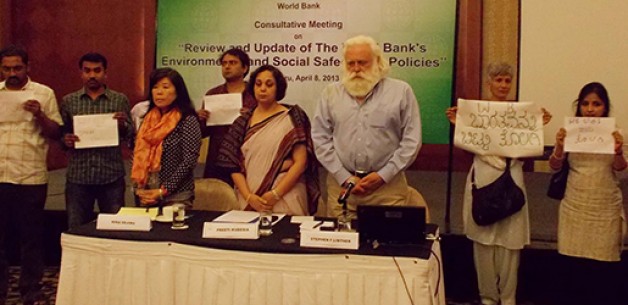The World Bank recently held three consultation meetings in India focused on its Safeguard Policy Review. The World Bank has been holding consultations worldwide with government officials, the private sector, and civil society in order to review the safeguard policies that aim to avoid or mitigate harm to both people and the environment in World Bank projects.
In the consultations, which took place in Delhi, Bangalore, and Bhubaneshwar, civil society moved beyond the confines of Bank’s formal consultation meetings where assessments in earlier consultations have been mixed. In the protests against the consultations, Indian civil society has charged the World Bank with funding environmentally unsustainable projects while claiming the Bank has been complicit in numerous human rights abuses and environmental violations.

Activists protest inside World Bank consultation in India
Three days later on April 8, 25 people representing 15 different groups gathered inside the Bangalore consultation and stalled the meeting. Each activist commented on World Bank practices and expressed how World Bank funding has undermined constitutional rights and harmed health, livelihoods, and the environment in India. Other activists decried the lack of democracy and transparency in the consultations themselves, the World Bank’s commoditization of women, and its hypocritical positions on environmental, social and political issues in the country, before the majority of participants left the meeting in protest.

Protest during World Bank consultation in Odisha
Indian civil society groups protested these consultations in a variety of ways including occupation of the meetings, rallies, speeches, street theater, song, dance, and more. The consultations reflected the frustration of communities that resist what they view as flawed World Bank investments, and the undermining of both national and local institutions. During the protests, the groups highlighted previous, current, and forthcoming problematic World Bank-funded projects, such as the Narmada Dam, the Tata Mundra Ultra Mega Power Project, Mumbai transport, and Financial Intermediary lending to a GMR coal plant, among others.
Through the lens of the aforementioned problematic projects, civil society clearly articulated the disconnect between the World Bank’s policies and practices and its failure to take into account important issues of governance, which have also been emphasized in formal World Bank consultations in other locales around the world.
According to one activist, these actions send “clear messages that the Bank, any IFI or government can [not] just move on from what they did. Actions have consequences and the perpetrators will have to face them just as our people have to face them.”
Additional Resources
World Bank’s sham ‘consultation’ to review of its environmental and social safeguards shut down in Bangalore, Environment Support Group and Alternative Law ForumNGO representatives stop World Bank meeting, Express News Service – BANGALORE, April 9, 2013
World Bank team faces protests, Express News Service – BHUBANESWAR, April 11, 2013
Jansatta E-Paper Coverage of Protests (Hindi)

